United Healthcare Mental Wellness: Your Guide to Feeling Better, Faster
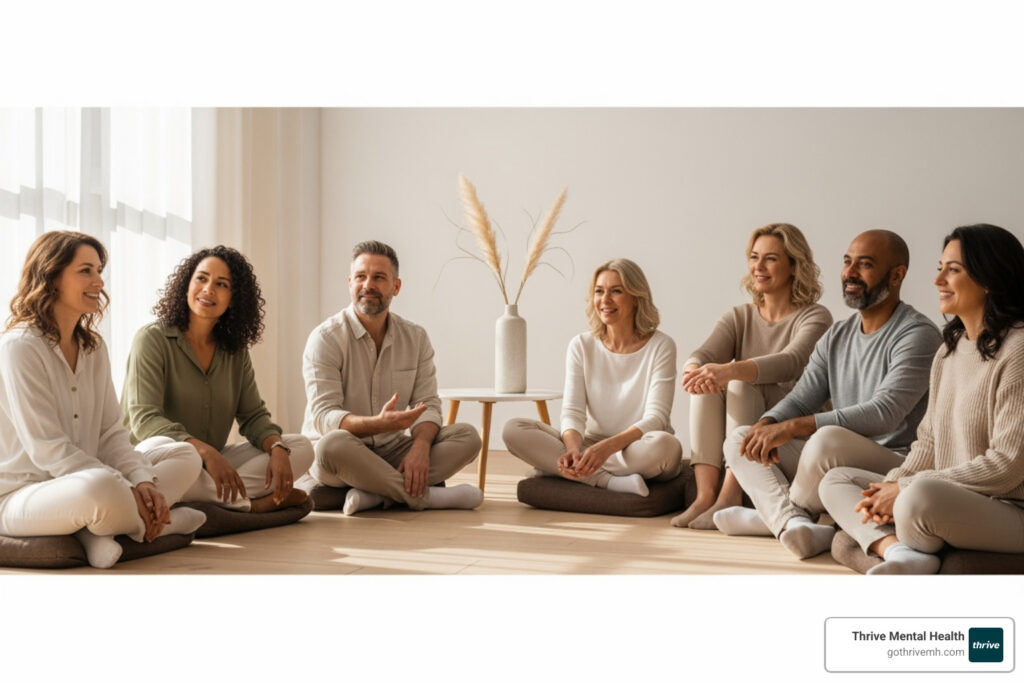
United Healthcare mental wellness: 1 Essential Guide
Why United Healthcare Mental Wellness Matters More Than Ever
United Healthcare mental wellness resources offer comprehensive support for the millions of Americans, including many residents across Florida, struggling with mental health challenges. With nearly 58 million adults experiencing at least one mental health condition in 2021, and 9 in 10 Americans believing we’re in a mental health crisis, understanding your coverage has never been more critical.
What United Healthcare Mental Wellness Includes:
- Therapy and psychiatry services (virtual and in-person)
- Employee Assistance Programs (EAP) with free counseling sessions
- Self-care digital tools and wellness platforms
- Crisis support hotlines available 24/7
- Specialized programs for children, caregivers, and substance use
The challenge isn’t just finding help – it’s finding help that fits your busy life. Whether you’re dealing with anxiety that interferes with work, depression that makes daily tasks feel impossible, or stress that’s affecting your relationships, United Healthcare provides a spectrum of support from self-help tools to intensive therapy programs.
Your coverage depends on your specific plan, but most United Healthcare members have access to behavioral health services that include both mental health care and substance use treatment. The key is knowing how to access these resources quickly and efficiently.
About the Author: As Nate Raine, CEO of Thrive Mental Health and leader in Healthcare & Life Sciences at Lifebit, I’ve spent over a decade working within the healthcare ecosystem to expand access to mental wellness resources, including partnerships with major insurers like United Healthcare mental wellness programs. My experience in both behavioral health innovation and healthcare strategy gives me unique insight into navigating these complex but valuable benefit systems.
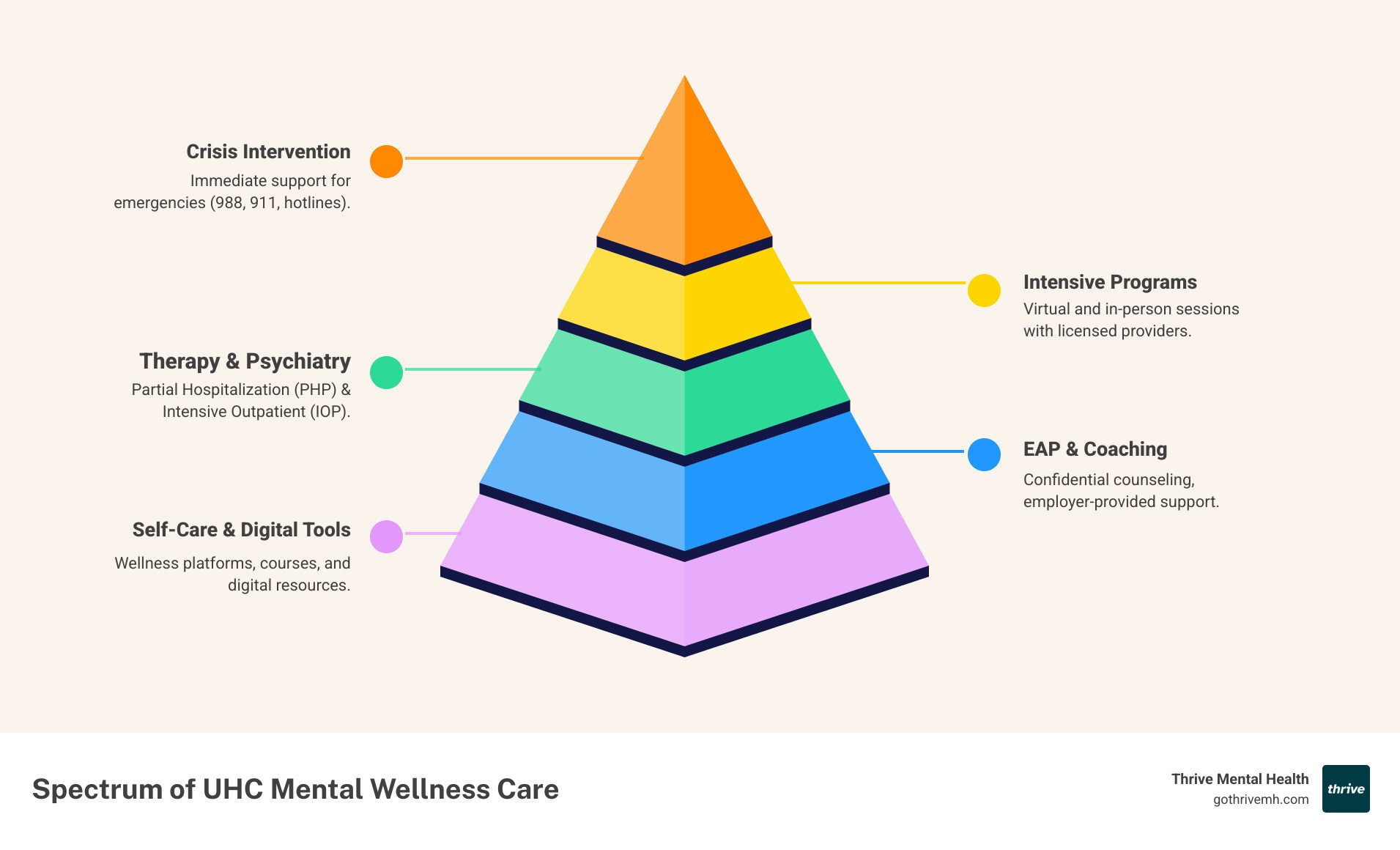
Quick United Healthcare mental wellness definitions:
- United Healthcare partial hospitalization
- United Healthcare therapist directory
- United Healthcare virtual therapy
Understanding Your United Healthcare Mental Health Benefits
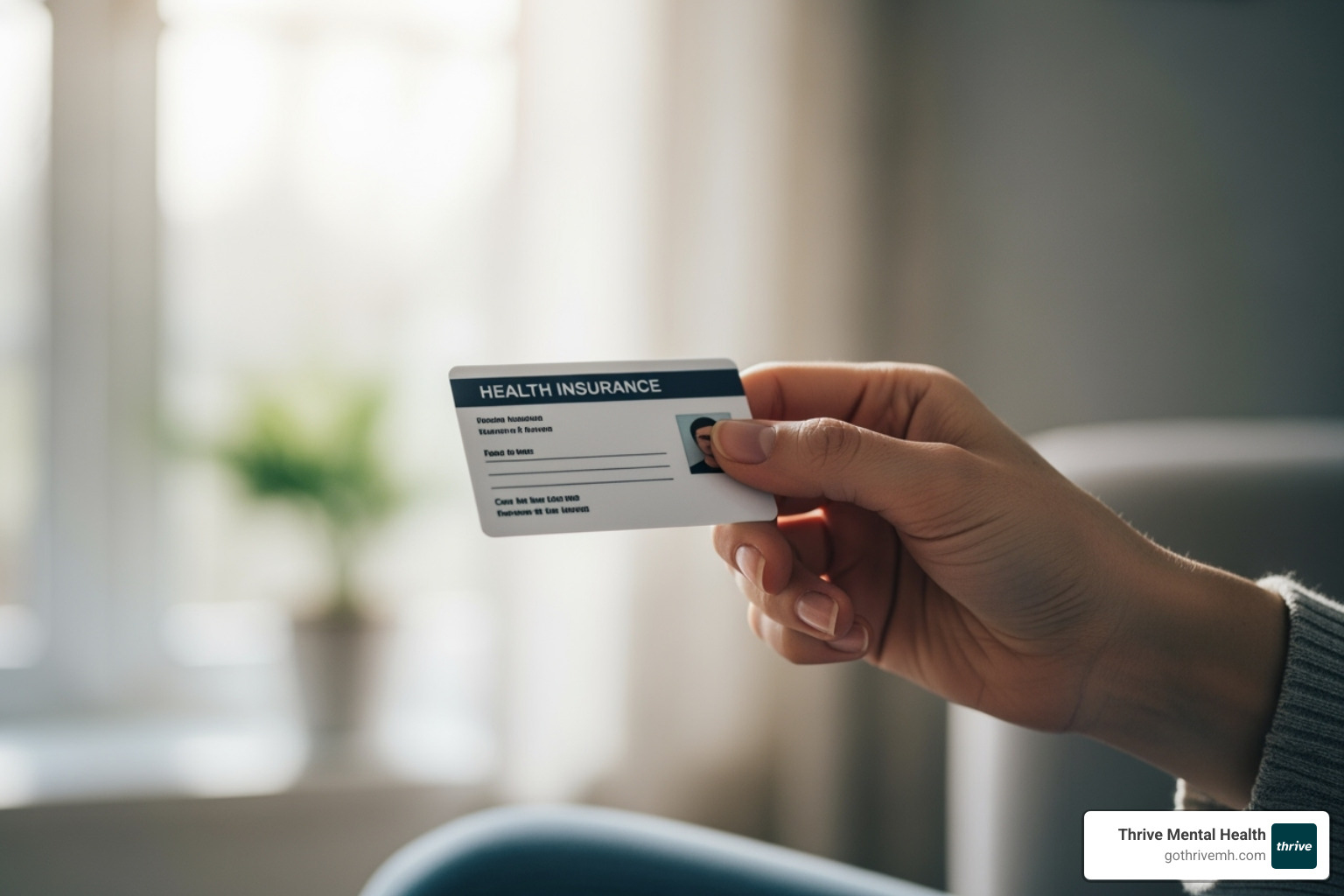
Understanding your United Healthcare mental wellness benefits doesn’t have to be overwhelming. Think of it like learning a new neighborhood’s layout; once you know where everything is, it becomes second nature.
UnitedHealthcare uses the term behavioral health to describe their mental health services. This isn’t just fancy insurance language; it covers more ground than you might expect. While mental health focuses on conditions like anxiety and depression, behavioral health includes substance use treatment and services for changing harmful habits.
Here’s what makes UnitedHealthcare different: they recognize that your emotional well-being connects directly to your physical health. That member ID card is your key to accessing therapy and psychiatry coverage, plus an Employee Assistance Program (EAP) many members don’t know they have.
Your specific benefits depend entirely on your plan. Like a gym membership, some plans give you access to everything, while others have restrictions. The good news is you can easily check what’s available by signing into your member account.
Does UnitedHealthcare cover therapy and psychiatry?
Yes, UnitedHealthcare covers both therapy and psychiatry services. However, your experience and costs will vary significantly depending on whether you choose in-network or out-of-network providers.
Think of in-network providers as your insurance company’s preferred partners. They’ve agreed to specific rates, meaning lower costs for you. Out-of-network providers aren’t necessarily worse; they just haven’t made those agreements, so you’ll typically pay more out of pocket.
The flexibility doesn’t stop there. You can choose between virtual and in-person sessions, a game-changer for many. Virtual therapy means no commute, no waiting rooms, and often more appointment availability. Some love the convenience, while others prefer the traditional in-person connection.
Most UnitedHealthcare members find their average copay for mental health services reasonable, though the exact amount depends on your plan. To avoid surprises, check your specific plan benefits before scheduling your first appointment.
What is an Employee Assistance Program (EAP)?
Your Employee Assistance Program is like a Swiss Army knife for life’s challenges—incredibly useful, but many people forget they have it.
EAPs provide confidential support that goes beyond mental health. You get free counseling sessions (usually a set number per year) and help with personal and work-related problems. Stressed about a legal issue? Your EAP can connect you with legal guidance. Worried about debt? They offer financial guidance too.
The beauty of EAP services is that they’re completely confidential. Your employer knows the program exists and its overall usage, but they never know if you’re one of them. It’s a private support system your workplace helps pay for.
If you have a UnitedHealthcare plan, accessing your EAP is usually straightforward. The process varies by employer, but you can find details through the UnitedHealthcare EAP and Mental Health Provider Information resources.
For our Florida readers needing more intensive support than traditional therapy, programs like partial hospitalization or intensive outpatient care can provide structured help while maintaining daily flexibility. These options are especially valuable for those in areas like Tampa, Orlando, and across the state who need robust care that fits into their lives.
How to Access Care: A Step-by-Step Guide

Getting the mental health support you need through United Healthcare mental wellness doesn’t have to feel like solving a puzzle. Think of it more like finding a good friend who happens to be a professional – someone who truly gets what you’re going through and can help you feel better.
The beauty of today’s mental health care is choice. You can meet with a therapist face-to-face in a cozy office, or you can have that same meaningful conversation from your favorite chair at home through a virtual visit. Many people find that telehealth fits perfectly into their lives, especially when juggling work, family, and everything else life throws our way.
The most important thing? Finding a provider you trust. That feeling of “this person really understands me” makes all the difference in your healing journey. UnitedHealthcare’s provider search tools are designed to help you find exactly that person.
Using the United Healthcare App and Member Portal
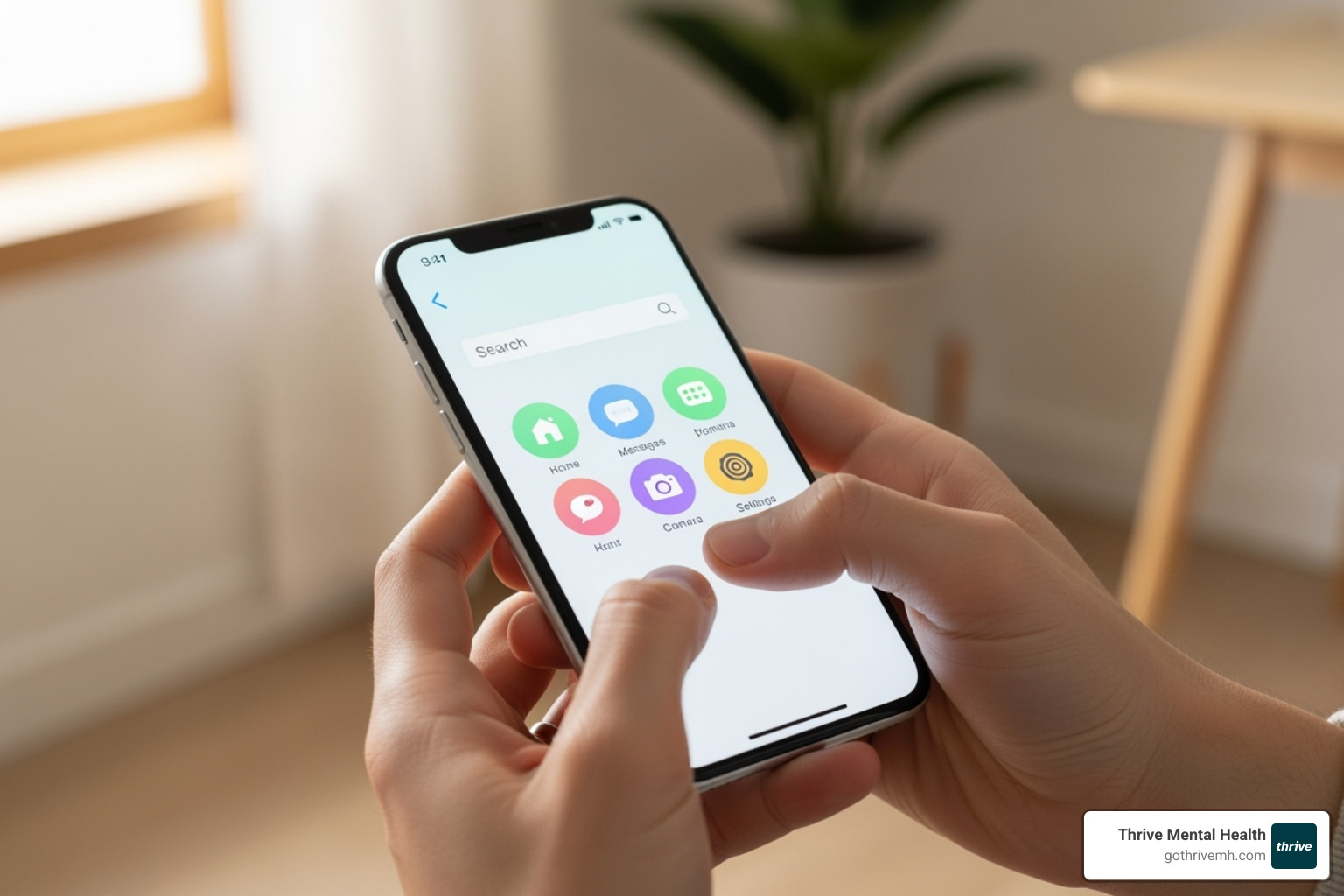
Your smartphone and computer can become powerful allies in managing your mental health. The myUHC portal and mobile app put your United Healthcare mental wellness benefits right at your fingertips, turning what used to be phone calls and paperwork into simple clicks.
Through these digital tools, you can find network providers who specialize in exactly what you need help with. Want to see a therapist who understands anxiety? Or maybe you need a psychiatrist who can help with medication management? The search function makes it easy to filter by specialty and location.
You can also view your plan details to understand exactly what’s covered, check your claims history, and see how much you might pay for different services. No more guessing games about costs or coverage limits.
The platform also gives you access to digital wellness tools – things like self-help courses, educational content, and other resources that complement your therapy sessions. It’s like having a wellness library available 24/7.
Getting started is simple. Sign in to your member account on your computer, or open the app on your phone. Once you’re logged in, you’ll wonder how you ever managed your healthcare without these tools.
Finding a Behavioral Health Provider
Here’s where things get practical for Florida residents. Your plan type – whether it’s a PPO or HMO – determines how you’ll search for the perfect therapist or psychiatrist.
If you have a PPO plan, you’ll use the Behavioral Health Directory on myUHC.com. Simply select “Employer and Individual Plans” and input your specific plan details. This directory includes both virtual and in-person providers, giving you flexibility in how you want to receive care. You can find a provider for PPO plans through this streamlined process.
For HMO plan members, the path is slightly different but just as straightforward. You’ll visit the Live and Work Well website, select “browse as a guest with a company access code,” and enter ‘UHC’ as your access code. This opens up a comprehensive directory of behavioral health providers available under your plan. Find a provider for HMO plans using this method.
Both directories understand that mental health care isn’t one-size-fits-all. You can search by location in Florida, specialty, and even whether providers offer virtual appointments. Take your time browsing profiles – finding someone who feels like a good match is worth the extra few minutes of research.
A Spectrum of Support: United Healthcare Mental Wellness Programs
United Healthcare mental wellness goes far beyond traditional therapy sessions. Think of it as a comprehensive toolkit designed to meet you wherever you are on your mental health journey. Whether you’re looking for quick stress relief techniques or deeper support for ongoing challenges, UHC offers programs that fit into your real life.
What makes these programs special is how they connect the dots between your mind and body. It’s not just feel-good philosophy – there’s real science behind it. For instance, people managing diabetes are 2-3 times more likely to experience depression. This connection shows why United Healthcare mental wellness takes such a holistic approach, recognizing that your mental and physical health work together as a team.
The beauty of UHC’s spectrum of support is that you can start small and scale up as needed. Maybe you begin with a self-paced mindfulness course, then add some virtual coaching, and eventually connect with a therapist. It’s your journey, and these programs are designed to grow with you.
Self-Care Courses and Digital Tools
Sometimes the most powerful step is the one you take on your own. UHC’s self-care courses put you in the driver’s seat, letting you learn and practice new skills at your own pace. These aren’t your typical online courses – they’re designed by mental health experts who understand what actually works in daily life.
The course selection covers the challenges most of us face regularly. You can Take course on mindfulness to learn how to stay present during stressful moments. If anxiety or low mood is affecting your daily routine, you can Start course on anxiety & depression to develop practical coping strategies. For those tough times when life throws curveballs, the Take course on resilience helps build your bounce-back skills.
Beyond these core courses, you’ll find programs focused on cultivating joy, improving sleep quality, and strengthening relationship skills. These might sound simple, but they address the building blocks of good mental health that we often overlook in our busy lives.
Digital wellness platforms like My Wellbeing take this support even further. They offer personalized goal-setting, activity tracking, virtual coaching sessions, and online communities where you can connect with others on similar journeys. It’s like having a wellness coach and support group available 24/7 through your phone or computer.
Programs for Specific Needs and Age Groups
Mental health isn’t one-size-fits-all, and UHC recognizes that different life stages and circumstances require different approaches. Their specialized programs meet people exactly where they are.
Children and youth mental health resources help families steer challenges that can feel overwhelming. Parents dealing with a child’s ADHD can access tools like the Vanderbilt Assessment Scales for ADHD to better understand their child’s needs. The Parenting kids with anxiety course gives parents concrete strategies to help their children transform worry into confidence.
Caregivers often put everyone else’s needs first, but UHC provides resources specifically designed for those caring for others. Whether you’re caring for an aging parent or supporting a family member through illness, these programs acknowledge that your wellbeing matters too.
Substance use support includes screening tools and treatment pathways that remove barriers to getting help. Resources like Alcohol use screeners help identify concerns early, when intervention is most effective.
For Florida residents who need more intensive support, programs like intensive outpatient (IOP) or partial hospitalization (PHP) can provide structured care while maintaining flexibility for work and family commitments. These programs are available to individuals throughout Florida, offering a higher level of care than traditional weekly therapy.
Addressing Common Mental Health Conditions
United Healthcare mental wellness programs tackle the mental health challenges that millions of Americans face every day. These aren’t rare conditions – they’re the struggles that can make ordinary life feel impossibly difficult.
Anxiety affects over 40 million adults in the U.S., but it shows up differently for everyone. Some people experience panic attacks, others have persistent worry, and many deal with social anxiety that makes everyday interactions challenging. You can Learn about the different types of anxiety disorders to better understand what you might be experiencing.
Depression can drain the color from life, making activities you once enjoyed feel pointless. Stress from work, relationships, or financial pressures can build up until it affects your sleep, appetite, and ability to concentrate. Burnout is increasingly common, especially among professionals who feel emotionally exhausted and disconnected from their work’s purpose.
Social isolation and loneliness became major concerns during the pandemic, but they affect people long before and after major life events. UHC’s programs address these challenges with practical strategies for building and maintaining meaningful connections.
The range of mental health conditions extends far beyond these common ones. For a comprehensive overview of various concerns and their warning signs, you can View a list of mental health concerns on the official mental health resource site.
The goal isn’t just to manage symptoms – it’s to help you build skills and find support that leads to genuine improvement in your daily life. Whether that means learning to quiet anxious thoughts, rebuilding motivation after depression, or developing healthier ways to handle stress, these programs provide the tools and guidance to get there.
Getting Help in a Crisis: Immediate Support Resources
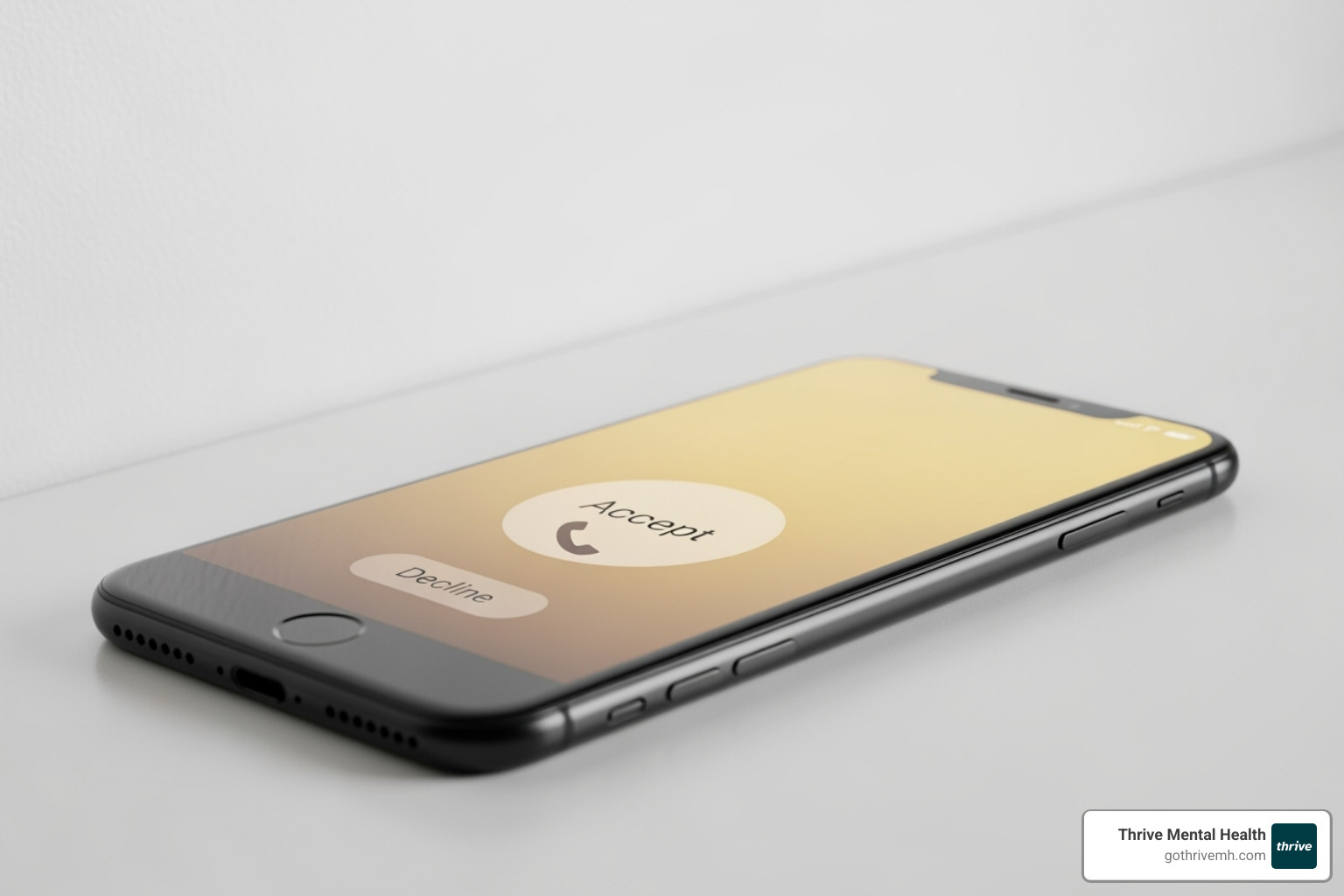
Sometimes life throws us curveballs that feel impossible to handle alone. When mental health struggles reach a crisis point, knowing exactly where to turn can make all the difference. United Healthcare mental wellness resources include clear pathways to immediate help, because we believe no one should face their darkest moments without support.
The key is understanding when to use which resource. If someone is in immediate physical danger or having thoughts of harming themselves or others, call 911 right away. This is for true emergencies where every second counts. But many mental health crises fall into that gray area where we desperately need help, but it’s not quite a 911 situation. That’s where crisis hotlines become lifelines.
Crisis hotlines offer something beautiful: confidential, professional support available 24/7. These aren’t just volunteers reading from scripts – they’re trained crisis counselors who understand exactly what you’re going through. They provide a safe space to talk when the world feels overwhelming, when anxiety won’t let up, or when depression makes it hard to see a way forward.
Your United Healthcare Mental Wellness Hotline Options
The most important number to remember is 988. The Suicide and Crisis Lifeline has revolutionized crisis support by making it as easy to remember as 911. Whether you call or text 988, you’ll connect with trained counselors who provide confidential support and can help you find local resources. The service works in both English and Spanish, and you can Learn about the 988 Lifeline to understand how it works before you need it.
For immediate, life-threatening emergencies – including severe mental health crises where someone might hurt themselves or others – call 911 without hesitation. Emergency services are equipped to handle these situations safely and can connect you with appropriate mental health professionals.
If you or someone you love is struggling with substance use, there’s dedicated support available. The Substance Use Helpline at 1-855-780-5955 (TTY 711) provides confidential guidance specifically for alcohol and drug concerns. Sometimes addiction and mental health challenges go hand in hand, and this specialized support recognizes that connection.
The National Domestic Violence Hotline serves as another crucial resource when mental health struggles intersect with relationship violence. You can call 1-800-799-SAFE (7233) or text “START” to 88788. This service operates in over 140 languages and understands the complex mental health impacts of domestic violence.
Reaching out for help during a crisis isn’t a sign of weakness – it’s one of the strongest things you can do. These resources exist because healing happens in community, and professional support can help you find your way back to stability and hope.
Frequently Asked Questions about United Healthcare Mental Wellness
When it comes to United Healthcare mental wellness programs, we understand that you might have questions about how everything works together. Let’s explore some of the most common questions we hear, so you can feel confident about the support available to you.
How does UnitedHealthcare integrate mental and physical health care?
Here’s something fascinating that many people don’t realize: your mind and body are constantly talking to each other. When you’re stressed, you might notice your stomach feels upset, or you get tension headaches. When you’re dealing with a chronic illness, it can really weigh on your mood and energy levels.
UnitedHealthcare gets this connection completely. They’ve built their approach around what experts call the mind-body connection – the idea that treating your whole person, not just individual symptoms, leads to better outcomes.
Take diabetes, for example. Research shows that people managing diabetes are 2-3 times more likely to experience depression. That’s not a coincidence – managing a chronic condition is genuinely challenging, and it makes sense that it would affect your mental health too.
What makes UHC’s approach special is how they encourage coordinated care between your primary care doctor and behavioral health specialists. Your regular doctor can spot early signs of mental health challenges and connect you with the right support. Meanwhile, your therapist or psychiatrist can work with your medical team to make sure all aspects of your health are being addressed.
This integrated approach means you’re not juggling separate, disconnected treatments. Instead, you get comprehensive care that recognizes how everything in your body and mind works together. For more details about how this coordinated care works, you can explore Information on integrated care.
How can employers leverage UnitedHealthcare’s behavioral health benefits?
If you’re an employer reading this, here’s something that might surprise you: 9 out of 10 Americans believe we’re facing a mental health crisis right now. Your employees are feeling this too, and it’s showing up in your workplace in ways you might not even realize.
Work-related stress isn’t just about people having tough days. It’s costing businesses billions of dollars annually through absenteeism, reduced productivity, and higher healthcare costs. But here’s the good news – investing in mental health support isn’t just the right thing to do, it’s also smart business.
United Healthcare mental wellness programs offer employers several powerful tools to support their teams. Employee Assistance Programs (EAPs) provide confidential counseling for both personal and work-related challenges. Virtual behavioral coaching gives employees flexible access to support that fits their schedules. On-demand digital support through wellness apps means help is available whenever someone needs it.
The return on investment is remarkable. For every dollar you invest in employee mental health support, research suggests you’ll see about $4 back in improved productivity and reduced healthcare costs. That’s not just feel-good statistics – that’s real business value.
If you’re interested in exploring what UHC can offer your organization, you can Ask for a quote for your business to see how their programs might work for your team.
What are the benefits of using UnitedHealthcare’s mental health programs?
When you’re looking for mental health support, you want to know that you’re making a choice that will actually help. United Healthcare mental wellness programs offer several benefits that can make your journey toward better mental health both effective and manageable.
First, you’re getting access to an incredibly large network – we’re talking about over 425,000 clinicians nationwide. This isn’t just about having lots of options (though that’s great too). It’s about increasing your chances of finding someone who really gets you and your specific needs.
The variety of support levels is another huge advantage. Maybe you’re just starting to explore mental wellness and want to try some self-help apps first. Or perhaps you need regular therapy sessions, or even more intensive support. UHC covers this entire spectrum, so you can find exactly the level of care that fits where you are right now.
Virtual visit options have been a game-changer for so many people. You can connect with your therapist or psychiatrist from home, during your lunch break, or even while traveling. This flexibility makes it so much easier to stick with your care plan, even when life gets busy.
From a practical standpoint, staying in-network saves you money. Many members find their copays quite affordable, which means you can focus on getting better instead of worrying about costs. This financial predictability removes one more barrier between you and the care you need.
Finally, all of these options add up to truly personalized care. You can work with your providers to create a plan that fits your lifestyle, your goals, and your preferences. For those in Florida who might need more intensive support, specialized providers like Thrive Mental Health offer flexible, expert-led partial hospitalization and intensive outpatient programs that work alongside your UHC benefits.
The bottom line? These programs are designed to meet you where you are and support you as you work toward feeling better.
Conclusion: Your Path to Feeling Better
Mental health challenges don’t have to define your story. Throughout this guide, we’ve walked through the comprehensive United Healthcare mental wellness resources available to you – from finding the right therapist and exploring helpful digital tools to understanding crisis support and seeing how your mental and physical health work together.
Knowledge is power, especially when it comes to our well-being. UnitedHealthcare provides an impressive foundation of support, but the most important step is yours to take. Maybe it starts with trying one of those mindfulness courses we mentioned, scheduling a virtual therapy session, or simply bookmarking the crisis hotlines for peace of mind.
Your mental wellness journey is uniquely yours. Some days might call for a quick self-care app session, while others might need the deeper support of professional therapy. The beauty of UHC’s approach is that it meets you wherever you are, with whatever level of support feels right.
For our readers in Florida who might need more intensive support, Thrive Mental Health offers specialized intensive outpatient (IOP) and partial hospitalization (PHP) programs that provide flexible, expert-led care. Our evidence-based programs are designed for adults and young professionals who need structured support while maintaining their daily routines. Whether you’re in Tampa Bay, St. Petersburg, Central Florida, or anywhere else in the state, our virtual and in-person options make comprehensive care accessible.
Taking that first step toward feeling better isn’t always easy, but you don’t have to do it alone. Your United Healthcare mental wellness benefits are there to support you, and resources like ours at Thrive Mental Health can provide the specialized care you might need.
Ready to explore how to make the most of your mental health coverage? Our detailed guide on Navigating mental health support with Aetna and UnitedHealthcare offers even more insights to help you feel confident about your next steps.
Remember: feeling better isn’t just possible – it’s within reach.